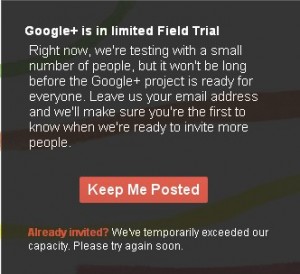Have you spent any time really kicking the tires with Google+? If you have, you’ve probably found, as we have, that there isn’t a lot to see over there.
From very obvious oversights such as the name Google choose to go with for the project (with Facebook you can “Like” or “Recommend”, but with Google you can only “Plus” a page … Whatever THAT means) to the awkward soft launch of the project itself, with Google’s patented invitation-only enrollment and this cryptic message that began appearing a few days ago for folks that were supposedly already enrolled: “Already invited? We’ve temporarily exceeded our capacity. Please try again soon.”
For whatever reason, as of right now it seems that Google+ misses much more than it hits, so if Google really intends to be a player in the social networking game, they are going to have to brush up on their social skills. Right now Google is just socially retarded.
With the massive buzz today related to Google’s acquisition of Motorola, there are at least two great news items related to Google+ and its inadequacies that may have fallen off your radar. As a public service, we will feature snippets of them here, now:
The first bit comes to us from Forbes in an article titled “A Eulogy for Google Plus“, and here are some of the highlights we found interesting:
Google Plus is a failure no matter what the numbers may say.
It’s a vast and empty wasteland, full of people who signed up but never actually stuck around to figure out how things worked in this new part of town. One simple click takes me back to Facebook, and my wall is flooded with updates and pictures from 400+ friends. This just isn’t a contest, and it never will be.
To know why G+ has failed, we must first look at how Facebook succeeded.
Facebook had exclusivity on its side, a once-upon-a-time fact we’re only reminded of when we watch The Social Network, but even when it expanded past college to the general population, it was a hundred times more user friendly and visually streamlined than MySpace. That site was destroyed by the tackiness of its own users with a propensity for glitter text GIFs and autoplaying pop songs, and when it failed to evolve, the exodus to Facebook was massive and unstoppable.
Now Google has fallen into the same trap with Plus. If anyone is annoyed by Facebook, it’s simply that they’re tired of using it. Their gripes aren’t from the layout, or even the privacy settings, as much as internet outrage over the suspect Terms of Service would have you believe. Google can launch a product that fixes Facebook’s issues, and even looks a touch nicer to boot, but its biggest flaw is simply something it can’t overcome. It’s not Facebook.
The next article related to Google+ and its flaws comes from the Charleston Daily Mail and is titled “Google’s attempt to end Facebook misses target“:
With its new social network, Google has scored a huge blow against its archenemy.
Yes, Google delivers features and functionality that Microsoft’s Bing search engine can’t touch.
Wrong archenemy, you say? Google is supposed to be a Facebook-killer? Ehhh, not so much.
At least not now. While Google brings some welcome new features to the social-networking space, there’s no great innovation that would make you want to use it as your primary online identity, or that Facebook couldn’t emulate if it chose to.
Google , which launched about a month ago, is officially a beta, or test, service; to join, you need an invitation from someone who’s already a user. Judging from the evidence, invites aren’t very hard to come by: Less than three weeks after launch, Chief Executive Officer Larry Page announced that the service had already signed up 10 million members.
That sounds like a lot, and it is. But considering that Facebook is up around three-quarters of a billion, Google has a long way to go before your friends are as likely to be hanging out there as they are on the competition.
The core of Google will be familiar to Facebook loyalists. Users can post items that friends can comment on, just like Facebook’s Wall. There’s also what Google calls the Stream, a flow of items posted by others – essentially, Facebook’s News feature. On Facebook, if you see a post you like, you can “Like” it; on Google , you can ” 1″ it.
And it isn’t just Facebook that Google borrows from. In addition to people you know, you also have the ability to latch on to those you don’t, as on Twitter, and add their posts to your Stream.
The Google system for managing all this is its most interesting feature: Circles. They’re an easy and logical way for you to organize the people in your network and decide whose stuff you want to see, and who you want to see your stuff. In some ways, it isn’t all that different from Facebook’s “Friend Lists,” but Google makes Circles far simpler to establish and manage.
Filed Under: SEO Portland Web Design

